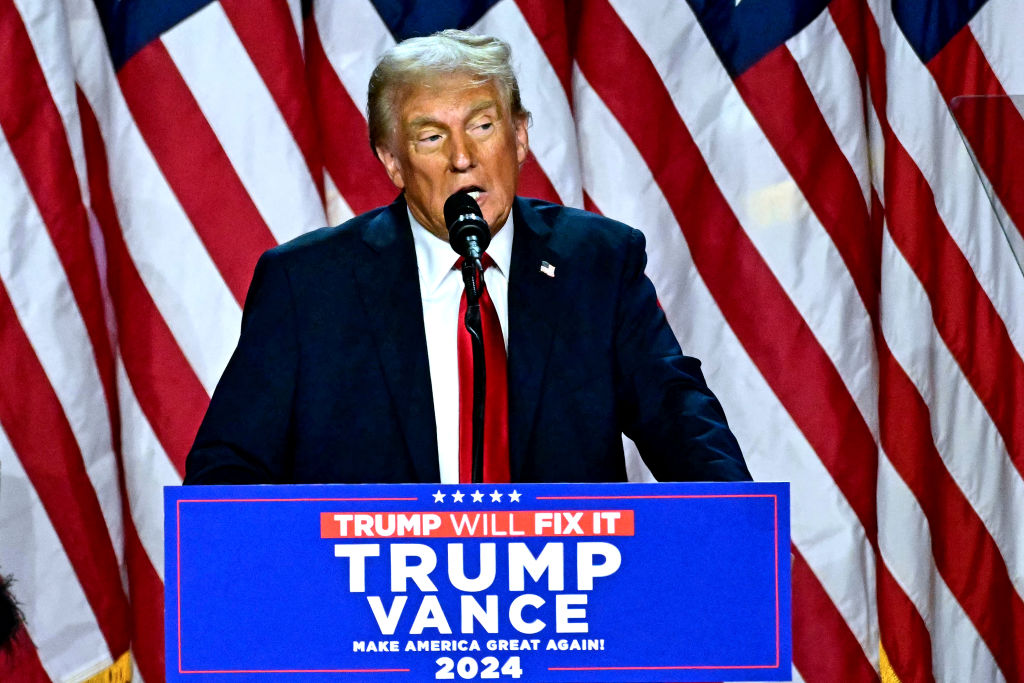I’d be lying if I said I wasn’t a little relieved.
Only a little, let me stress. I repeat my point from Monday, with emphasis: Reelecting Donald Trump after January 6 is the greatest dereliction of civic duty by the electorate in the history of the United States. We’ll pay for it in years to come, over and over, sometimes in grotesque ways. Without exaggeration, the country that you and I knew no longer exists.
But humans are vain even in their bleakest moments. So indulge a pundit in his vanity.
My strongest political conviction in middle age is that Americans are contemptible. Not all of them (box checked!), and certainly not always or even often in their personal behavior. But if there’s any theme that ties the last 26 months of this newsletter together, it’s that We the People as a political community are amoral, unserious about governing ourselves, and undeserving of our constitutional bequest. There is no “Trump problem” and there never has been. There’s only a voter problem.
If you believe all of that, as I do, you necessarily believed that Trump would win convincingly last night. Yet, weirdly, not many others who share my skepticism of Americans did. Even my friends at The Bulwark, normally as gloomy about the state of the country as I am, felt confident enough about a Kamala Harris victory to host an election night livestream where they could react to the results in real time.
Are you getting the most from your Dispatch membership?

I didn’t watch the returns. Instead I spent a pleasant evening watching true-crime documentaries on streaming platforms, slept well, then picked up my phone at 5:30 this morning to scroll the news. Doing so, I felt like an Atlanta Falcons fan who had turned off the Super Bowl in the third quarter with his team up 28-3, utterly convinced that his team would blow the lead somehow and unwilling to witness the horror of it, and then looked at the final score later to find that he’d been … completely vindicated.
It’s a strange feeling. On the one hand, you wonder if you’ll ever spend another day not wanting to vomit. On the other, you think: I’ve never been so right in my entire life.
That’s where the hint of relief I mentioned earlier came from. I’ve spent two years urging readers to abandon their faith in Americans, then Americans turned around and handed Trump not just a second term but what appears to be an outright majority of the popular vote. I honestly don’t know how to react to being this right. It’s never happened before—and, for all our sakes, it had better never happen again.
Being right is a queasy consolation following Trump’s victory but a consolation all the same. Let’s talk about some other consolations of watching our country deliberately be set on fire by the fine patriots we call friends and neighbors.
The satisfactions of disaster.
Some consolations are petty.
For instance, I can’t help but relish the fact that Trump didn’t need Nikki Haley on the trail after all. In the end, according to the exit polls, Harris won just 5 percent of Republicans, scarcely more than the 4 percent of Democrats won by Trump. He believed that Reagan conservatives, zombified by tribal partisanship and negative polarization, would turn out for him no matter how contemptuously he treated their preferred candidate in this year’s primary.
He was right. No one deserves the political irrelevance she’s achieved today as richly as Haley does. She sold out by endorsing him for the sake of her career; now she has neither a career nor the respect of either side of the right’s Trump divide, insofar as such a thing still exists.
Other consolations are speculative.
Trump’s reelection means the end of the Pax Americana. He may or may not recall U.S. troops from Europe and the Far East, but the era of U.S. allies depending on America’s commitment to Western liberalism is plainly over. And that era won’t return after Trump leaves office: NATO countries would be insane to ever again bet on the good sense of the American voter.
2016 was a victory for Trump, but 2024 was a victory for Trumpism. As I said in another newsletter not long ago, if you elect a cretin once, you’ve made a mistake. If you elect him twice, you’re the cretin. Other nations will take note and act accordingly.
And maybe that’ll work out. There’s always been a case that U.S. allies would benefit from taking greater control of their own defense. Instead of pouring their budgets into creaking welfare-state programs and outsourcing their security to America’s umbrella, they’ll prioritize more responsibly going forward. A remilitarized Europe and Asia might deter Russia and China more effectively than the United States could.
But probably not, right? The reason the Pax Americana exists in the first place is that militarization in Europe and Asia has historically been, er, problematic. Under U.S. leadership, the postwar world order had a stellar record of preventing major conflict. Now that that leadership is sunsetting, expansionist powers will want to test the strength of neighbors in their Near Abroad. If I were in charge in Kyiv or Berlin or Tokyo or Seoul, my country’s new nuclear weapons program would already be in motion today.
The biggest consolation we have, though, is clarity.
I wanted to see Trump defeated resoundingly but, if that wasn’t in the cards, I at least wanted the results to be morally clear. Had he eked out a 270-268 Electoral College win or prevailed with a minority of the popular vote a la 2016, we would have suffered through another four years of excuse-making on behalf of American voters. They didn’t really choose Trump, you see. If only Harris had done this or that, if only this or that lucky break hadn’t gone Trump’s way, everything would have been different. America is still America.
No one actually believes that after last night’s results, do they?
Half-hearted excuse-making will still happen, if only as a byproduct of recriminations. Neoliberals will blame progressives for dragging the Democratic Party too far to the left. Progressives will blame neoliberals for failing to produce an inspiring agenda. Harris will be second-guessed for not doing more media and for choosing Tim Walz over Josh Shapiro. Historians will posit counterfactuals in which inflation never gets rolling and/or Joe Biden takes border enforcement seriously. Political junkies will question whether Americans will ever, ever elect a woman.
There’s a little truth to all of that, but none of it explains the magnitude of what’s happened. Americans reelected a man described by his own former advisers as a fascist, having already witnessed how willing he is to abuse presidential power toward fascist ends and understanding that returning him to office will immunize him legally for those abuses. They chose someone who, to quote David Frum, “knowingly promotes hatred and division; who lies—blatantly, shamelessly—every time he appears in public; who plotted to overturn an election in 2020 and, had he not won, was planning to try again in 2024.”
And they did so overwhelmingly. Never in U.S. history has the public chosen leadership this malevolent this decisively. The moral clarity of their decision is crystalline, particularly knowing how Trump will regard his margin as a “mandate” to do his worst. We’ve learned something about America that we didn’t know, or perhaps didn’t believe, and it’ll forever color our individual judgments of who and what we are.
The most one can plausibly say to try to excuse Trump’s voters is that they chose him because they believe he’ll make the trains run on time, not because they’re yearning to see the enemy from within treated like the vermin they are. But that’s no excuse at all: Fascism has always thrived on amorality, not immorality. Trump’s greatest enabler isn’t the man in the red hat, it’s the man who doesn’t care what he does to his enemies, or to the country, as long as the price of eggs comes down.
Which, by the way, it won’t.
Moral responsibility.
Earlier this week, a Dispatch colleague pointed out that both campaigns terrified voters this year about the consequences of the other winning and argued that we as a publication have a responsibility to remind frightened readers of that.
I agree, sort of. What I would say is that we have a responsibility to tell our readers the truth. It is true that Trump’s and Harris’ operations turned the fear dial up to 11. And if it’s true that Americans are overreacting to the dangers of a second Trump term because of that, we should say so.
But if it’s true that they’re reacting appropriately to those dangers, or even underreacting to them, we should say that too.
For example, I do think it’s hysterical for Democrats to believe that we’ll never have another election in America. I do not think it’s hysterical to believe that the 2028 presidential election will be … irregular, let us say. “Trump and his vice president–elect, J.D. Vance, will now try to transform the federal government into a loyalty machine that serves the interests of himself and his cronies,” Frum wrote, correctly, after the results were in on Tuesday. Just as Elon Musk has remade his social media platform into a political weapon, Trump will set about trying to do the same with the executive branch.
You’re kidding yourself if you believe that he and Vance will graciously stand aside in 2029 and let some victorious Democrat like Josh Shapiro waltz into the White House and tear that “loyalty machine” to pieces. I can’t tell you how far they’ll go to prevent it but I’m confident that it’s further than most of us assume. I quote Vance himself: “We are in a late republican period. … If we’re going to push back against it, we’re going to have to get pretty wild, and pretty far out there, and go in directions that a lot of conservatives right now are uncomfortable with.”
The significance of Tuesday’s results is that conservatives, and many not-so-conservatives, aren’t uncomfortable with that direction at all.
On that note, as they celebrate today, let me share with them a thought borrowed from retail: You broke it, you bought it.
“You broke it, you bought it” is always a consolation in defeat after an election. Never Trumpers are used to it. If you voted for Joe Biden in 2020 for the sake of ousting Trump, you’ve spent four years being told by the right that inflation, our porous border, and every species of wokery known to man are personally your fault. By the same token, we might say, conservatives who voted for Trump on Tuesday are personally to blame for the protectionism, isolationism, and mind-boggling budget deficits to come irrespective of their feelings about those policies. When you vote for a guy and he wins and screws up, that’s on you.
I think the moral force of “you broke it, you bought it” is much greater when the winning candidate is a visionary, though, because in those cases his supporters are validating something unusually concrete and particular. They’re signing on to a philosophy of government, not just the typical grab bag of policy sludge. Take Ronald Reagan: If you voted for him in 1980 because you hoped he’d solve inflation, you couldn’t rightly turn around in 1981 and complain that you didn’t support all of this “small government” claptrap that he kept babbling about.
He ran on a vision of smaller government. It was the whole point of his campaign! You didn’t need to celebrate that vision to justify preferring him to Jimmy Carter, but you knew that you were empowering him to enact it by supporting him. By definition, you were comfortable with the possibility that he would do so. You broke it, “it” in this case being the liberal orthodoxy of the 1960s and 1970s, by electing a conservative visionary. And so you owned the consequences of breaking it, for good or ill.
The only other visionary president of my lifetime is Trump. If there was a redeeming quality to his campaign this year, it’s that he was clear with Americans about his vision. He could have run, dishonestly, as a reformed businessman who’d seen the error of his ways after January 6. But he made no pretenses about “retribution” against his enemies, about foiling the criminal cases against him, about replacing federal bureaucrats with loyalist fanatics, and generally about exploiting power as much as possible to turn the presidency into a system of personal patronage. It’s a postliberal vision, textbook authoritarianism.
If you voted for him, you don’t get to feign shock as he goes about trying to realize that vision. Whether you support him because of the fascism or in spite of it, by definition you were comfortable enough with it to cast your ballot for him.
On Tuesday morning, I passed some time scrolling through news stories I’d bookmarked over the last few weeks, luxuriating in the insanity of the kakistocracy Trump voters are about to unleash. Abortions cause hurricanes; a “secretary of retribution”; rescinding the broadcast licenses of unfriendly news bureaus; anti-vax kookery inside the West Wing. There’s a lot of demagogic woo-woo know-nothing-ism at the top of the American right, and it’s going to break a lot of things. And the “normal” Republicans in Congress won’t try to stop it. On the contrary, they’ll say—and are already saying—that they owe it to Americans to give them every stupid, destructive thing they voted for.
Those Republicans are correct. Trump’s voters broke America and deserve to get what they’ve bought, economically, politically, and morally. I was right about the rottenness of the electorate and I’ll be right, in spades, about the rottenness of Trump’s abuses in a second term. And when millions of our friends and neighbors decide they don’t care how abusive he’s being so long as he’s hurting the right people, I’ll remind everyone who’s scolded me for assuming the worst about our wonderful fellow Americans that I was right about that too. If you’ve been dismayed by what Trump voters have been willing to condone in the past, get ready. You ain’t seen nothing yet.
Getting to watch an amoral country be serially embarrassed by the consequences of its immoral choices is the greatest consolation of all.
Fight, fight, fight.
We’re going to hear a lot of nonsense from Never Trump conservatives in the months ahead about how “the valuable work of democracy goes on” and we must “fight to save America” or whatever. And that’s fine. It’s human nature to answer defeat with defiance.
But it’s also silly. Ultimately, a country is just its people, and you can’t save people from themselves.
“It’s our institutions that we need to save!” you might reply. My friend: If Americans cared a whit about their institutions, Tuesday wouldn’t have gone the way it did. Who are you saving those institutions for, exactly?
The lesson of this election is that the American people aren’t worthy of their Constitution. Maybe they never were, but at the core of American exceptionalism is the belief that our nation is virtuous by design in a way others aren’t. Electing Trump once shook that belief; electing him twice has obliterated it. Those of us who clung to it, foolishly, are now strangers in a strange land, exiled inside a country many of us are destined to no longer feel fully part of.
If that’s too bitter a truth to swallow, then spit it out—again, human nature—but it is what it is. President Trump, his accomplices, and his legions of supporters will make you swallow it eventually.







Please note that we at The Dispatch hold ourselves, our work, and our commenters to a higher standard than other places on the internet. We welcome comments that foster genuine debate or discussion—including comments critical of us or our work—but responses that include ad hominem attacks on fellow Dispatch members or are intended to stoke fear and anger may be moderated.
With your membership, you only have the ability to comment on The Morning Dispatch articles. Consider upgrading to join the conversation everywhere.